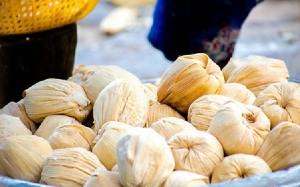In July 2007, the government of Ghana announced a change in the country’s currency through a re-denomination exercise initiated by the John Agyekum Kufuor administration.
This became necessary due to the decline in the value of the cedi as the Bank of Ghana changed the cedi denominations to eliminate the many zeroes on the cedi at the time.
For example, ¢500,000 became GH¢50, ¢1000 became GH¢1, ¢20,000 became GH¢2, etc.
The re-denomination was carried out as part of the government’s efforts to assure citizens and markets that hyperinflation was a thing of the past. Inflation was as high as 116% in 1977, 117% in 1981, and 123% in 1983.
The exercise was also undertaken to realign the cedi with other currencies in the West African region just as ECOWAS member countries are in anticipation of a common currency, the Eco.
As part of the sensitization program, an advert detailed the currency’s new value to Ghanaians in 2007.
“The Bank of Ghana will be changing our currency; From July 2007, our money will change. There is no change in value, the value remains the same. A tuber of yam you buy for 12,000 will be 1 Ghana cedi 20 pesewas, a ball of kenkey you buy for 1000 will be 10 Ghana pesewas and your 2000 trotro fare will be 20 Ghana pesewas,” the advert said.
However, 17 years later, inflation has more than tripled, the exchange rate has more than quadrupled, and the general cost of living has increased astronomically forcing many businesses to either fold or lay off workers.
Some Ghanaians have attributed the country’s current woes to the re-denomination exercise, while others believe it is the mismanagement of successive governments that has led to the current state of the economy which is under an IMF bailout program.
To put things into context, a tuber of yam currently costs about GH¢45 at various places in the capital, a ball of kenkey sells between GH¢6 and GH¢10, while transport costs have skyrocketed to about GH¢7 to GH¢15 depending on your destination.
Social media users constantly lament the state of the economy amidst the exchange rate woes as fuel prices continue to rise to above GH¢12 per litre on average, while the cedi sells at above GH¢17 as of November 2024.
Now the question remains whether the re-denomination exercise was a just cause or one that eventually crippled the country’s local currency which continues to struggle against major trading currencies.
See some reactions below:
Must watch 🔥🔥🔥🔥❤️This is what Bawumia did as the governor of Bank of Ghana under Kuffour. He’s been a scam since. These people shouldn’t be anywhere close to the presidency 🔥🔥https://t.co/0nBdR7WwvY
— Berry ☯︎🦍🥷 (@fanti_boy) October 7, 2024
Bro i remember den times way I day buy kenkey with 10ps.Herrrrrrrrr bro 😎
— SLIME 💴🦅 (@WasaniMohammed) October 7, 2024
In 2007, $1 = ₵10,000
— KOJO FOREX (@KojoForex) November 1, 2024
Kuffuor think say e wise, come delete 4 zeros ( 0‘000)
Make $1 come turn Gh₵1
( In his own words the value is the same)
Fast forward 17yrs on today,
$1 = Gh₵ 17 (which is actually ₵170,000)
So the Cedi devalued from ₵10,000 to ₵170,000 to $1…
I’m beginning to accept that, Prez Kuffour’s redenomination of the cedi did more harm than good to us. 😔 https://t.co/5zTSlWFNMX
— NERD PAGGE 🇬🇭 (@iamsamuelpagge) November 1, 2024
It’s ‘understandable’ that the Veep deflects when it comes to economic questions. If you’ve played a central role in managing an economy where inflation soared to decades-high levels, the cedi depreciated at an unprecedented rate since redenomination, debt soared to unsustainable…
— Alfred (@CallmeAlfredo) October 30, 2024
Why are costs of a state-owned Ghanaian company being calculated in US dollars and not cedis? Is it that we don't care about our legal tender anymore?
— I, Nii Moi Thompson (@Attaanii) November 1, 2024
It's lost 94% of it value since redenomination and still losing.
Surely, we must care. Or?
SSD/MA
Watch the latest edition of BizTech below:
Click here to follow the GhanaWeb Business WhatsApp channel







![NPP Flagbearer, Dr. Mahamudu Bawumia [L] and NDC Flagbearer John Mahama NPP Flagbearer, Dr. Mahamudu Bawumia [L] and NDC Flagbearer John Mahama](https://cdn.ghanaweb.com/imagelib/pics/869/86902869.295.jpg)









